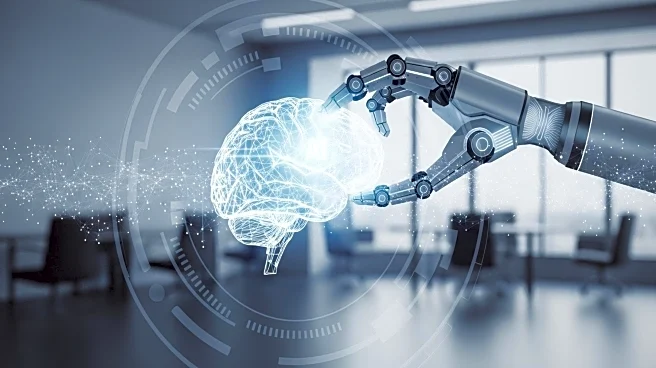What's Happening?
The rapid advancement of artificial intelligence (AI) is significantly transforming industries and employment landscapes in the United States. By 2025, sectors such as financial services, software publishing, healthcare, and logistics are experiencing substantial productivity and job creation due to AI integration. The World Economic Forum's 2025 Future of Jobs Report highlights seven key AI roles reshaping employment, including Machine Learning Engineers and Generative AI Specialists. These roles demand a combination of technical skills and creativity, with professionals in AI-focused positions earning significantly higher wages than their non-AI counterparts. The U.S. states of Maryland, California, and Texas are leading in AI readiness, offering numerous job opportunities in AI-related fields.
Why It's Important?
The AI-driven transformation presents both opportunities and challenges for the U.S. economy. Industries adopting AI are seeing increased productivity and new revenue streams, which can lead to economic growth and job creation. However, the demand for skilled AI professionals is outpacing supply, highlighting the need for workforce upskilling and education. Investors are encouraged to focus on sectors with strong AI penetration, such as financial services and healthcare, to capitalize on the growth potential. The geographical disparity in AI adoption also suggests that regions with robust AI ecosystems will attract more investment and talent, further driving economic development.
What's Next?
As AI continues to evolve, the U.S. workforce must adapt to meet the growing demand for AI skills. Companies are likely to invest in upskilling initiatives and AI research to maintain competitiveness. Investors will need to strategically allocate resources to sectors and regions that are not only adopting AI but are also redefining it. The long-term perspective suggests that AI-centric roles will form the backbone of future job markets, with projections indicating the creation of millions of new jobs by 2035. This underscores the importance of aligning investments with AI-driven industries to secure sustainable value.
Beyond the Headlines
The AI revolution is not just a technological shift but a fundamental transformation of how industries operate. It challenges traditional employment models and necessitates a reevaluation of workforce strategies. Ethical considerations, such as the impact of AI on job displacement and privacy, will also need to be addressed. The successful integration of AI into the economy will depend on balancing technological advancements with human potential, ensuring that AI serves as an enhancer rather than a replacement for human capital.











